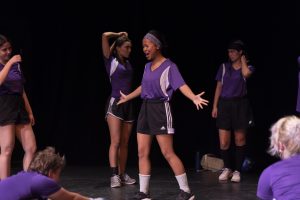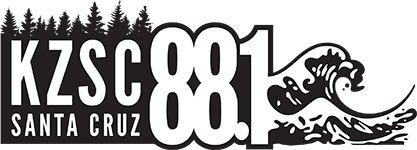
By Isabella Fredriksson-Allen
My hot-pink ½ ZAP book is etched out with looped notes which scream “KINETIC”, “Tampons vs. Twitter”, “catapulting connection” and “the best love; friendship”. Easily interchangeable with the highlights of a slumber party, instead, it’s my show notes from the Barnstorm Theatre Company’s offering of The Wolves. Sentences are hastily interrupted with song titles whilst words are smudged by the undeniable ink spill of tears. Afterward, I catch up with cast member Izzy Pedego and confide that I hadn’t expected to cry. She shrugs, nonplussed, “well, that’s what playwright Sarah DeLappe does to you”. Delappe is the Pulitzer-nominated playwright who inspired UCSC student Molly Robbins to submit her proposal to direct through the Barnstorm Theatre Company. It’s been a wild success, with the opening weekend selling out and the same predicted for the remaining shows.
Slipping backstage, I sit down with the cast of The Wolves to chat about everything from sexism in sports, revisiting your high-school years and why we need more complex roles for women. The atmosphere is relaxed, unlike any other backstage I’ve visited, and the cast swaps notes on smoky eyes whilst we talk.
Isabella Fredriksson-Allen: Thank you for having me here. Jumping straight in, I wanted to ask you what it’s been like to act in a production notably absent of men.
Izzy Pedego: So, I’ve been doing theatre since I was about five years old, and I have never ever been in a cast without men in it.
Celeste Lagrange: Yeah, I can only speak for me, but this was the most comfortable production I’ve ever been in. Personally, I would go into the rehearsal space without a fear of being judged.
IFA: It’s also a production that doesn’t entertain the male gaze, how has that affected the portrayal of your characters?
Oona Fitsmaurice: For me, it changes how I can embody certain facets of the character. Exploring certain aspects of sexuality, how would that character react to being in an environment with no men.
CL: I think if anyone of these characters had been male-identifying then the dynamic would have been totally changed.
IP: Men get well-written characters all the time, and it is so rare that you get a cast of not only no-men but each female character is so different and doesn’t fit a stereotype. That’s rare in playwriting, period. Like, regardless of however masculine or feminine the show is written, to have ten non-male characters, each with very distinct personalities just doesn’t happen.
IFA: What has the cast-comraderie been like?
IP- Whether it’s intentional or not, I think there’s a lot of competition in the theatre world, especially when there are only, say, three roles up for grabs and so people will intentionally or unintentionally scrap a little. But there’s nothing to scrap about here. There was no fight for the centre of attention, there was no fight for the lead because there isn’t a lead in this show. It’s an ensemble show and there is no main character, if you look at the programme it’s listed in alphabetical order of the last name because there is no way to rank them.
OF- Even though it’s an ensemble piece every character has their moment to shine and their moment on stage for the audience to get to know them better, their moment outside of the team dynamic.
IFA: Delappe states that although we are watching a soccer team’s bodies the whole time it’s not sexualised and instead about the “ownership and strength of their own bodies”- do you agree?
IP: A lot of times, female roles in traditional theatre pin women as “oh she’s the beautiful one”, or there’s the love interest. I feel like love is a big part of a lot of storytelling and this show is about love but it’s about platonic love and I think that enables you to not worry about “oh do I look beautiful all the time”. No one is described as beautiful, it’s not the same way as a typical boy meets girl love story plays out.
Ellery Harrington: I think women’s sports are already hyper sexualised and the fact that we are on there and there is no male gaze specifically.
CL: And in the play, they talk about how they are uncomfortable when they’ve been sexualised, when the coach asks them to scrimmage in their sports bra when they are minors, you never get to see that on stage, and the thought of a non-male team going through that is really upsetting.
IFA: How did it feel to be diving back into your high school years?
Gillian O’Leary: I think the epigraph to the play is something like “we are all the same age inside” and it resonates with me at 20 and I think it will still resonate with me when I’m 30.
IFA: And finally, why should folks come out and watch The Wolves?
OF: It’s really funny and it’s an experience you won’t get from other theatres, especially as it’s such an intimate location. You are with us, you are like experiencing everything we’re experiencing because it’s so close and so intimate and with this show it’s written in a way that’s so modern for right now in a way that I don’t think anything else. I think it’s really hard to find show like this and I don’t think it’s an opportunity you would want to pass up.
IP: I think it’ll surprise people. It’s accessible. It’s actually written like how teenagers talk, we interrupt each other and ‘like’, ‘uh’ and ‘um’ are written into the script.
CL: This is a play that no matter who you are, how you identify there’s something for everyone and it is just so refreshing to see a non-male perspective and that something relatable could come from all of this.
The Barnstorm Theatre presented The Wolves 19th and 20th of November 2022.
Included below is the master playlist from The Wolves. Director Molly Robbins asked each cast member to submit a playlist that they imagined their character would listen to. It informed their portrayal of the characters, would be played in rehearsals and ultimately included be in the pre-show playlist. It’s a heady mix of everyone from Sheryl Crow to the Spice Girls to The White Stripes. It sounds like a summer and feels like a home coming dance; enjoy.

